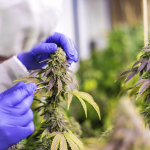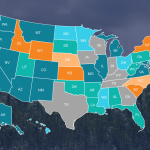Cannabis reform is slowly sweeping across the Midwest region of the United States, including North Dakota, South Dakota, Minnesota, Wisconsin, Illinois, Indiana, Ohio, Michigan, Kansas, Nebraska, Montana, and Iowa. Holding some of the more active states, like South Dakota, and some of the states most opposed to cannabis, like Kansas and Nebraska, the Midwest offers a wide range of activity as the country legalizes state by state. In states like South Dakota and Michigan, advocates and government entities are pushing for legalization, offering a positive outlook for cannabis businesses in these states. However, in states like Kansas and Iowa, the hope for legalization is slim, and may be difficult even after federal legalization.
North Dakota
In 2016, voters approved Measure 5, legalizing medical cannabis in North Dakota. Since then, several adult-use cannabis bills have made it to the House, but have yet to pass. The most recent, House Bill 1420, House Bill 1501, and House Bill 1201, were approved by the House of Representatives but quickly voted out by the Senate in March 2021, ending the state’s cannabis reform efforts for the rest of the year. Even more recently, an initiative to put cannabis legalization on the November 2022 ballot fell short by over 10,000 signatures. It is difficult to pinpoint why legalization efforts have been so difficult for North Dakota and legalization does not seem to be on the horizon any time soon.
South Dakota
Unlike its northern sister state, South Dakota voters approved ballot measures in 2020 to legalize both medical and adult-use cannabis in the state, although the Supreme Court overturned the adult-use law last fall. However, the Governor recently signed several bills into law to create what she calls a “safe and responsible” medical cannabis program that is focused on patients. There was some debate to determine home cultivation regulations, but lawmakers have since passed Senate Bill 24, a compromise legislation that limits patients to four plants — two mature and two immature. In addition to Senate Bill 24, a few other bills were signed into law which outline some other details of the medical cannabis program and what can be expected.
Though this is a promising next step for South Dakota, there is still great debate over the adult-use cannabis program and when that will be approved. South Dakota must now decide on regulations, create a Commission or Department, and decide how patients will be prioritized over the potential adult-use program. There are still many variables in place before anyone can expect to see license pursuits, but South Dakota is looking like a promising new state to legalize.
Minnesota
Minnesota approved their medical cannabis program in 2014, but are nowhere near other states that approved that long ago (i.e. Colorado in 2012). Over the last year, legislation to legalize adult-use cannabis has passed the House, but has been rejected by the Senate and this continues to be an up-hill battle. However, some allotments in the 2022 budget allows for the potential for adult-use cannabis legalization. While this could mean legalization is right around the corner for Minnesota, medical patients were only given the ability to consume cannabis through smokeable flower just this year and still do not have access to infused edibles due to strict regulations.
Wisconsin
Though there is a medical cannabis bill headed to the House, cannabis is still strictly criminalized with high penalties for possession in Wisconsin. However, support is growing and, while the state legislature is extremely strict, cities like Green Bay are relaxing cannabis laws and penalties.
Illinois
Illinois, with a previously stalled license application process due to several lawsuits, is working towards streamline their cannabis business application process after a judge has lifted the injunction. On March 14, Sangamon County Judge Gail Noll restored the applications of 11 unsuccessful applicants who had sued the state to challenge its decision to disqualify them.
Additionally, Judge Noll recently lifted a stay order that was put in place to prevent state regulators from awarding 60 adult-use craft cannabis cultivation licenses. In lifting this order, the state can now announce the winners of the craft grow permits which have been on hold since December. The state says they are evaluating the ruling to determine how to move forward with the licensing process efficiently with regard to a fair and equitable process. This is expected to allow for major expansions within the state which currently has only 21 licensed cultivation operations.
Indiana
Indiana is one of the few states to have neither a medical or adult-use cannabis program set up. There have been discussions over new potential bills in 2022, but previous legislature has been met with aggressive opposition and no such bills have been introduced to legalize. Possession is also still punishable by incarceration and exuberant fines.
Ohio
In 2016 with House Bill 523, Ohio legalized medical cannabis and launched its medical cannabis program. Most recently, an advocacy group (Coalition to Regulate Marijuana Like Alcohol) has been pushing for regulations on adult-use cannabis similar to those imposed on alcohol, but have fallen short in changing the minds of those on the Senate. The Ohio Senate President has explicitly stated that he will never bring the issue of cannabis to the Senate floor, leaving ballot-measures as the only option for legalization. While this is a grim outlook for Ohio’s adult-use program, the medical program is making way in adding new qualifying conditions to its list.
Michigan
Michigan legalized adult-use cannabis in 2018 and has since expanded their market immensely. Michigan is currently reaping the benefits of an established, regulated market as the price for an ounce of flower has dropped to $171 in just one year. In March of last year, Michigan began accepting cannabis business application from any individual – not just those who previously owned or ran a medical facility – and the application has been a rolling submission ever since. While the application is a fairly easy process and those that meet certain Social Equity requirements could qualify for a discount, the need for security and a plan to secure employees and patients is always present.
Kansas and Nebraska
Kansas and Nebraska are two states with almost no promise of a cannabis program on the horizon. While both states have sent medical cannabis bills to the Senate this year, both have been met with aggressive opposition from lawmakers and voters.
Montana
Montana’s adult-use cannabis sales kicked off this January and have seen an increase with each passing month. The application is still open to potential business owners.
Iowa
Iowa’s strict medical program shows no promises for a thriving adult-use market. With a 4.5 gram limit for a 90-day medical supply, Iowa is clearly hesitant on allowing access to high-quality cannabis. Though a proposal to put the legalization of adult-use cannabis on the 2022 ballot has been released, Iowa still has a long road to legalization and an eventual thriving market.
How Can Sapphire Risk Help?
Tony Gallo and the team of experts and consultants at Sapphire Risk Advisory Group have worked in 35 states and are excited to work in more states as the cannabis industry expands. Follow us on social media to stay up to date with more security best practices and cannabis industry updates!
- California Senate Bill 69 Adds CEQA Requirements for New Cultivators

- Top 5 Cannabis Security and Surveillance Violations

- Peace of Mind in the Retail Sector: Facility Security

- Opportunities in the Ohio (O-High-O) Cannabis Market

- Building Security and Trust: Verifying Identification and Payments

- The Importance of Loss Prevention

- Thoughts to Improve Cannabis Security Regulations Across the Nation

- Opportunities in the Minnesota Cannabis Market

- U.S. Cannabis Legalization 2023 Update

- How to Present Your Cannabis Business Vision to Your City


